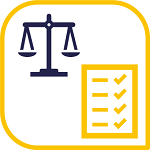
Section 4.10. Legal assistance and representation
Legal assistance is fundamental to inform applicants of their rights and obligations during the asylum process. A legal representative can ensure that the applicant fully comprehends the process and fully complies with the relevant obligations.
The provision of legal aid in the early stages of the asylum procedure increases the efficiency of the entire process by allowing case officers to assess a complete and accurate file, reducing the burden on decision-makers, reducing the rate of appeals and safeguarding the right to non-refoulement. EU legislation requires Member States to make free legal assistance and representation available on request and under certain conditions during appeal procedures.821
In 2022, some EU+ countries continued efforts to improve access to and the quality of legal assistance in all stages of the asylum procedure. They launched new initiatives and projects, for example contracting specialised lawyers working in asylum matters and offering additional support to applicants with special needs. Professional development and new tools were made available for legal practitioners, with the overall aim of improving the quality of services. Significant efforts were also noted in the provision of legal aid services throughout the asylum procedure through digitalisation and interconnectivity between determining authority portals and court platforms.
However, as reported in previous years,822 the implementation of the recast APD remained an issue of concern at the border, in detention facilities and in the appeals procedure due to insufficient information and access to legal assistance and representation. In some cases, the short time limits in the border procedure, in special procedures or the Dublin procedure resulted in limited, poor quality or non-existent legal assistance.
Civil society and international organisations scrutinised legislative proposals and amendments made in 2022 which could hamper access to legal aid at the border. For example, UNHCR reiterated the need to ensure procedural safeguards, including access to free legal assistance during a border procedure and while in detention.823
Box 6. Assistance to displaced persons from Ukraine

Once the Temporary Protection Directive was activated to provide protection to displaced persons from Ukraine, the Council of Europe opened migration e-desks to assist lawyers and legal professionals who were managing substantial caseloads.
The virtual Asylum/Migration HELP e-Desks are managed by tutors and legal experts to support lawyers in countries neighbouring Ukraine, namely: Romania, Slovakia, Hungary, Poland (with EU support) and Moldova. In addition to these portals, National HELP eDesks were set up in Belgium, Bulgaria, Cyprus, Czechia, France, Germany, Greece and Spain, while several others are in preparation (for example in Latvia, Lithuania and Slovenia).
Similarly, the Legal Aid Coordination Centre in Poland mobilised efforts to provide continuous legal assistance and information to displaced Ukrainians, either in person or electronically (through its website and helpline). The centre is supported and funded by the Norwegian Refugee Council since June 2022 and works with 14 Ukrainian lawyers.

4.10.1. Legal information and access to legal aid as prerequisites of an effective asylum procedure
- 821Directive 2013/32/EU of the European Parliament and of the Council of 26 June 2013 on common procedures for granting and withdrawing international protection (recast). https://eur-lex.europa.eu/legal-content/EN/TXT/PDF/?uri=CELEX:32013L0032&qid=1614260129667&from=EN, Articles 20 and 21.
- 822European Union Agency for Asylum. (2021). EASO Asylum Report 2021: Annual Report on the Situation of Asylum in the European Union. https://euaa.europa.eu/sites/default/files/EASO-Asylum-Report-2021.pdf; European Union Agency for Asylum. (2022). Asylum Report 2022. https://euaa.europa.eu/asylum-report-2022
- 823United Nations High Commissioner for Refugees. (January 2022). UNHCR's Recommendations for the French and Czech Presidencies of the Council of the European Union (EU). https://www.refworld.org/docid/61d71e864.html




